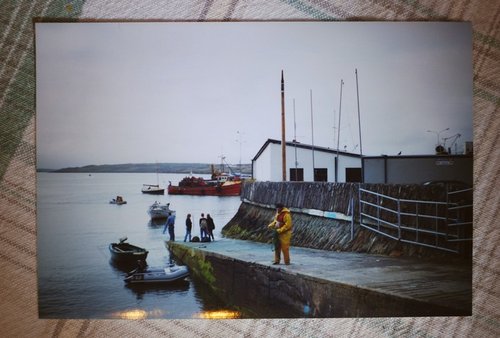Joshua Claybourn at In The Agory has posted an article titled “Why Your Children Won’t Remeber 9/11“.
It immediately brought to mind the book I’m now reading, “The Stolen Village : Baltimore and the Barbary Pirates” by Des Ekin (2008). My daughter gave it to me on 9/11, for my birthday.
The sack of Baltimore in 1631 was in some respects like the attack on New York. The author describes it as “the most devastating invasion ever carried out by the forces of the Islamist jihad on Britain or Ireland” and says it “was recognized at the time as an unprecedented act of aggression by the Islamist empire.”
He might be overplaying the “jihad” and “Islamist” aspects of what happened in 1631, but there is also another possible similarity: I bet most people don’t remember it. I hadn’t even heard of it until a few months ago, when I was listening to book about Stephen Decatur and heard a brief mention of Baltimore. Time will tell in the case of New York. (Read the article for an explanation.)
The mention in the Decatur biography caught my attention because we had visited Baltimore ten years ago. I can’t find my own photos of the visit, but my wife took some snapshots.
That’s me, looking down toward the same Baltimore harbor to which the Barbary pirate ships had come.
This is more of the harbor. I’m not sure if it’s the same place where the ferry to Cape Clear docked. It doesn’t seem quite like it. The next day after this photo I let the others go on ahead to the island while I did some bicycling around Baltimore, than caught a later ferry to join them. I remember some confusion about when and where I should carry my bike onto the ferry, and this doesn’t quite seem like the place.
The ruins of the O’Driscoll castle are in view not only here, but also from the place where we sat overlooking the harbor and drinking Guinness. I remember wondering just briefly at the time of our visit about the history and the vulnerability of Baltimore on the extreme southwest of the Irish island. A few days earlier the wind had blown me to Spanish Point, where a part of the Spanish Armada had been destroyed in the famous but unsuccessful invasion of 1588. (I hadn’t intended to go there, but had gotten lost while riding my bicycle over some of the ridges toward the ferry at Shannon. I then took the course of least resistance and ended up at Spanish Point, from where I had maps to help me find my way.) Thinking about Spanish ships off the coast of Ireland in 1588 made me think of how exposed a place like Baltimore was.
Des Eskin’s book does a good job of connecting the story to the present. On page 65 he writes:
It was a profitable business, and no-one took more advantage of this trade than the Great O’Driscoll clan. They were a powerful mafia, one of three major sea-roving families who operated a racket of piracy, smuggling and extortion around the Irish coastline. The name still dominates the district: the joke is that you can’t throw a stone without hitting an O’Driscoll, and in view of their fierce temperament it wouldn’t be the wisest thing to do.
Last night I was informed that the B&B where we stayed on Cape Clear belongs to an O’Driscoll. I don’t recall that she was very fierce of temperament, but then I wasn’t throwing stones, either.


